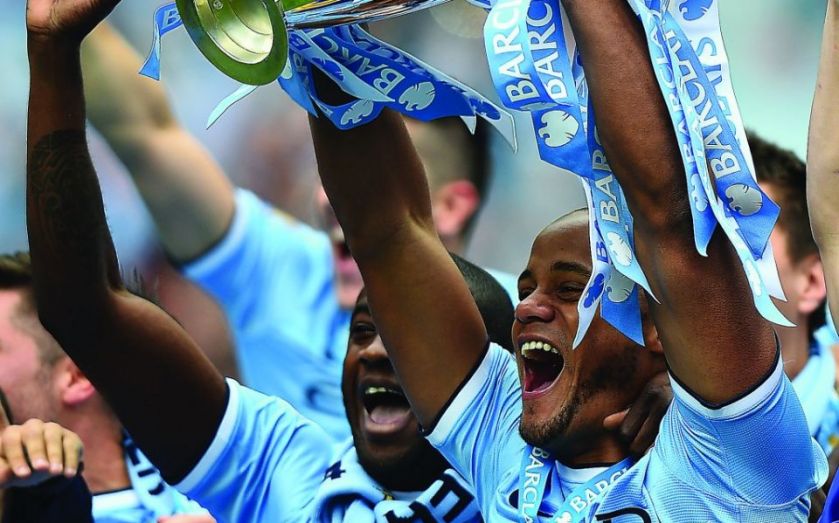Deloitte Football Money League: Real Madrid stay top of rich list as English clubs’ influence increases

Deloitte’s Dan Jones talks Frank Dalleres through the Football Money League.
PREMIER LEAGUE SUPREMACY
England’s top-flight teams have never been richer. More than £5bn worth of contracts with broadcasters kicked in last season, leading to record revenue for all 20 clubs and an unprecedented global financial dominance.
Every single Premier League team makes it into the worldwide top 40 of Deloitte’s Football Money League, published today – “a remarkable achievement,” according to the report’s author, Dan Jones.
English presence in the top 10 rose from four teams to five, from six to eight in the top 20, and eight to 14 in the top 30. To put that into context, it means Stoke, Sunderland and Swansea all generated more revenue than storied clubs such as Porto, Lazio, Corinthians and Celtic.
Further uplift in TV money is expected and could bolster the Premier League contingent, although Jones, of Deloitte’s Sport Business Group, says they will not colonise the rich list’s upper reaches completely.
“I don’t think it will get that far,” he told City A.M. “There are enough other huge clubs elsewhere around Europe that would make up at least 10 other places.”
UNITED WARNED
Real Madrid may be top of the pile for a 10th successive year, but Deloitte predict that Manchester United could be about to reclaim the title of the planet’s richest club. That depends, however, on rediscovering the winning habit on the pitch.
United are back up to No2, due to their unmatched commercial muscle and the TV cash boost, and are set for a further uplift from a world record £750m kit deal with Adidas set to start next season. But they need to ensure a return to the Champions League, and all its concomitant riches, in order to usurp Real in 2015-16.
“If they get that footballing piece of the jigsaw right then that could take them back up to No1,” Jones said. “People say the football’s not important any more, it’s just about the money, but the two things absolutely go hand in hand and they need to get the footballing bit right to be where they want to be financially.”
TICKET PRICES
As commercial and broadcast revenue streams have become more important to the biggest clubs, so matchday income – derived largely from tickets – has dwindled in significance.
“There is still significant revenue there to be made and more than there ever has been before, but there is probably more priority on filling the ground than maximising revenue than there has been,” Jones said.
Sponsors and TV companies want their clubs to have full stadiums – it looks and feels better, and is a key ingredient in England’s success – but do not expect ticket prices to fall.
“Let’s remember a plateau is not a cliff,” Jones added. “We’re not calling the absolute top of the matchday market. But its place within the overall picture has changed.”
CLOSED SHOP
For all the upward social mobility of England’s more modest top-flight teams, it is looking increasingly difficult to supplant a handful of European giants who have long dominated the Football Money League.
Real Madrid, Bayern Munich, Paris Saint-Germain, Manchester City, Chelsea and Arsenal were all non-movers in the top 10, while Barcelona and Manchester United swapped places and Liverpool were the only newcomers.
“The guys who are at the top are pretty similar to who they were 10-20 years ago,” Jones said. “The good news is it’s not just about the money and clubs can outdo them on the pitch. So whether it’s Atletico Madrid in Spain, Southampton in England or Borussia Dortmund in Germany over the last few years, money is definitely only part of the story.”
CITY FOOTBALL GROUP – A MODEL?
Manchester City’s position as one of a growing stable of clubs in their Abu Dhabi owners’ City Football Group stable has attracted controversy but reflects “the global nature of their ambitions”, says Jones.
They are not the first to try similar ventures, with Ajax having a sister team in Cape Town and Atletico Madrid a club in the recent Indian Super League, and observers have speculated it could become a trend.
“I think we might see other teams dipping their toe in that water, but others may take a view that they’re only going to have one team and still try to achieve things globally, but by a different route,” says Jones.
“It gives you more depth and more roots in a particular market. City now have Melbourne City playing in Manchester City colours; there’s clearly a closer bond and affiliation between City and Australia than if they just came every five years and did a tour match or had soccer schools.”